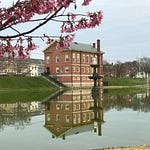Listen to The Saturday Stoke
I am tired of being harried by the noise of my world.
I want to find peace in the midst of chaos. I want to make space for beauty in my life—I want it to touch me through not only my eyes but through my ears and nose and skin.
I want to greet beauty in the smile of a random walker.
So, I come to the meadow, my park of choice, to seek out the nourishment my soul desires.
I too often fail to feed myself the food of beauty. Like my friends and family, and maybe you too, I ram through my days and weeks and months forgetting how much my soul longs for the times of gangly-limb-gazing and mud-brown river walks—for a simple walk in the park.
And when I take a moment to sit on the grass in a park, or walk a nearby path, I find myself battling with the tensions in my life: the necessity of work and my desire to rest, the responsibilities of my role as a father and husband and the longing to soak up moments with my children and wife, the pursuit of a means to live, and the craving to live untethered to worldly possessions.
How swiftly I marginalize beauty.
“A luxury I cannot afford. Time I cannot waste. A commodity with no real-world value,” I tell myself.
When I talk to myself like this, too often the pace and pragmatism of this world win out, and I push through. I leave my longing behind.
But I know I am not built to live without desire for the beautiful. And yet, I convince myself to do it.
What is it that changes in me during the times when I choose to allow the pace of life to overtake the moments in which I truly see the world’s abundant beauty?
Am I knowingly betraying the way in which God created me?
Or perhaps it’s not a change in me at all. Maybe I’ve been—or allowed myself to be—rewired by my environment. Maybe my propensity for distraction is simply my cultural programming.
The world grooms me to be a spectator rather than a participant.
When I think about how I feel when I attend a sporting event or concert, the spectator observation I made earlier makes sense to me.
Here I am, sitting or standing, watching a game or performance unfold. I spectate from the sidelines or from the audience. Here I am, enjoying the concert from a distance.
But my mind wanders and I imagine how the event might feel differently if I were to stand on the side-stage while the band or orchestra played. I’m closer to the performers, but I’m still spectating.
It’s the same for the sporting event. I imagine myself standing on the sidelines of a football or soccer game. My excitement heightens because I’ve moved closer to the event itself. I feel a sensational energy. I’m on top of the action. And yet, I’m still only a spectator.
Now I imagine myself as a participant.
I can smell the grass and even my opponent. I feel his body move against mine; the force, the sweat, the sounds of grass being torn up by cleats. I feel the crowd noise rather than being the one making the noise.
I sense the thrill of the game like no one else in the stadium because I am playing the game.
I’m a participant.
Back to the concert. I hear the music differently because I’m performing it. And it energizes me.
I hear the crowd singing along and screaming and applauding. I see their movement, the light from their smartphones as they raise them, signaling another encore because of course, no one uses a lighter anymore. I feel the energy of my bandmates.
Despite how the world grooms me, I was created to participate. This much I know, and this I pursue. Participation.
Participating requires more from me. And the requirements cost me.
I must work at it; sweat, train, learn, see, listen, respond, move, sacrifice, fail, begin again.
Spectating offers me similar feelings of exhilaration but does not require anything from me. I need only possess the means to consume.
Convenience joins spectating; sacrifice accompanies participation.
Here’s a quick hack for experiencing full participation.
Start tomorrow; the Sunday worship gathering.
Go with this perspective in mind, and meditate upon it: I’m not here to consume, to spectate. I’m here to participate in the life of God.
To sing songs to him about his glory.
To pray with my brothers and sisters.
To take the bread and the cup and remember Christ.
What does this participation do to and for us?
It removes our individualist tendencies. Our anthropocentrism (human centered) disappears as we express, through worship, the “theocentricity” (God centered) of the created order.
Take a few moments, and read Psalm 148, in which the psalmist invites the whole created order into this theocentric posture; a posture of participation.
Let them praise the name of the Lord,
for his name alone is exalted;
his splendor is above the earth and the heavens. (148:13)
Our pace of life matters, friends. Among other things, it can remove us from participating fully in life and with God.
If we’re not careful, we’ll find ourselves on the sidelines just consuming a spectacle instead of participating in the moments filled with glory.
Stay stoked, my friends.















Share this post